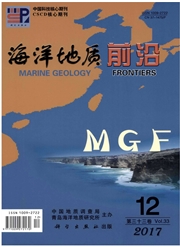

 中文摘要:
中文摘要:
根据2015年采集的3 500km浅地层剖面资料,以层序地层学为理论基础,运用地震地层学的分析方法,结合沉积学原理的相关理论,对福建北部近岸海域典型浅地层地震剖面声学反射特征进行了系统的分析和解释。根据本次获得的浅层地震剖面资料和以往的相关解释结果,将研究区浅部地震剖面划分为6个主要的地震反射界面(从上至下定名为QT1、QT2、QT2^1、QT3、QT3^1、QT4),这些界面将剖面划分为5个地震单元(从上至下定名为SU1、SU2、SU3、SU4、SU5)。详细描述了每个地震单元的反射界面特征及其层序内部特征,合理推测了每个地震单元的沉积地层特征及其演化,为研究福建北部近岸海域的沉积环境提供科学依据。
 英文摘要:
英文摘要:
3 500 km of shallow seismic profiles were acquired in 2015 from the northern seas area of Fujian province. Interpretation is made systematically based on the sequence stratigraphy and seismic stratigraphy for the sediment deposited since late Pleistocene. According to previous researches and related results, the seismic profiles of the study area may be divided into 5 main seismic units, namely SU1, SU2, SU3, SU4, SU5 from top to bottom by 6 interfaces of QT1, QT2, QT2^1, QT3, QT3^1 and QT4 respectively. Detailed descriptionis are carefully made for both the seismic units and the reflection interfaces. Rational inference is also made for the depositional history of the region.
 同期刊论文项目
同期刊论文项目
 同项目期刊论文
同项目期刊论文
 期刊信息
期刊信息
